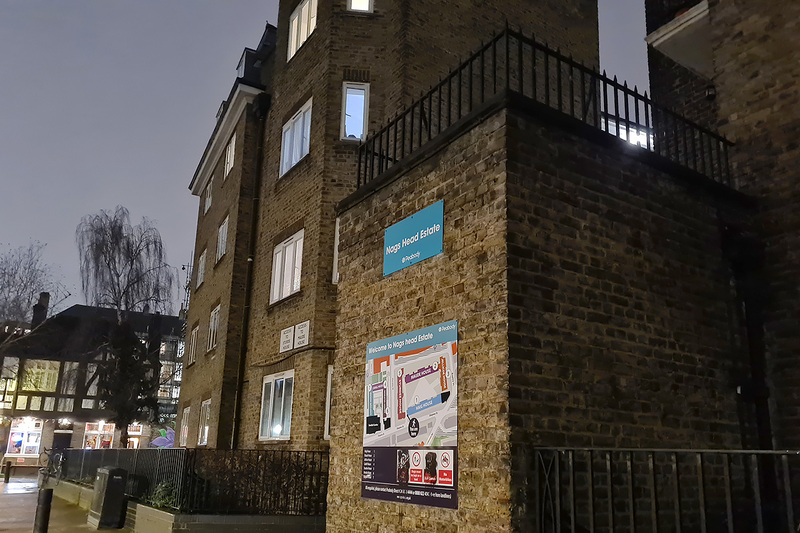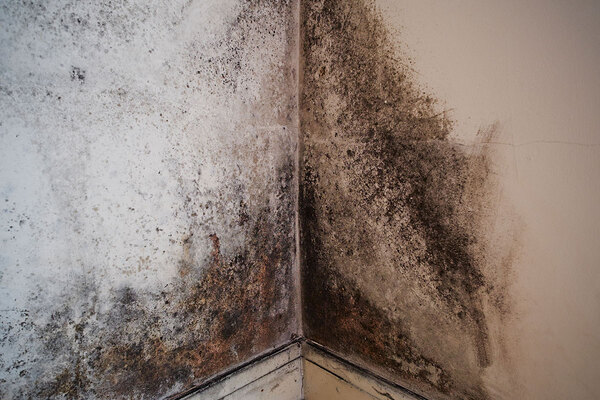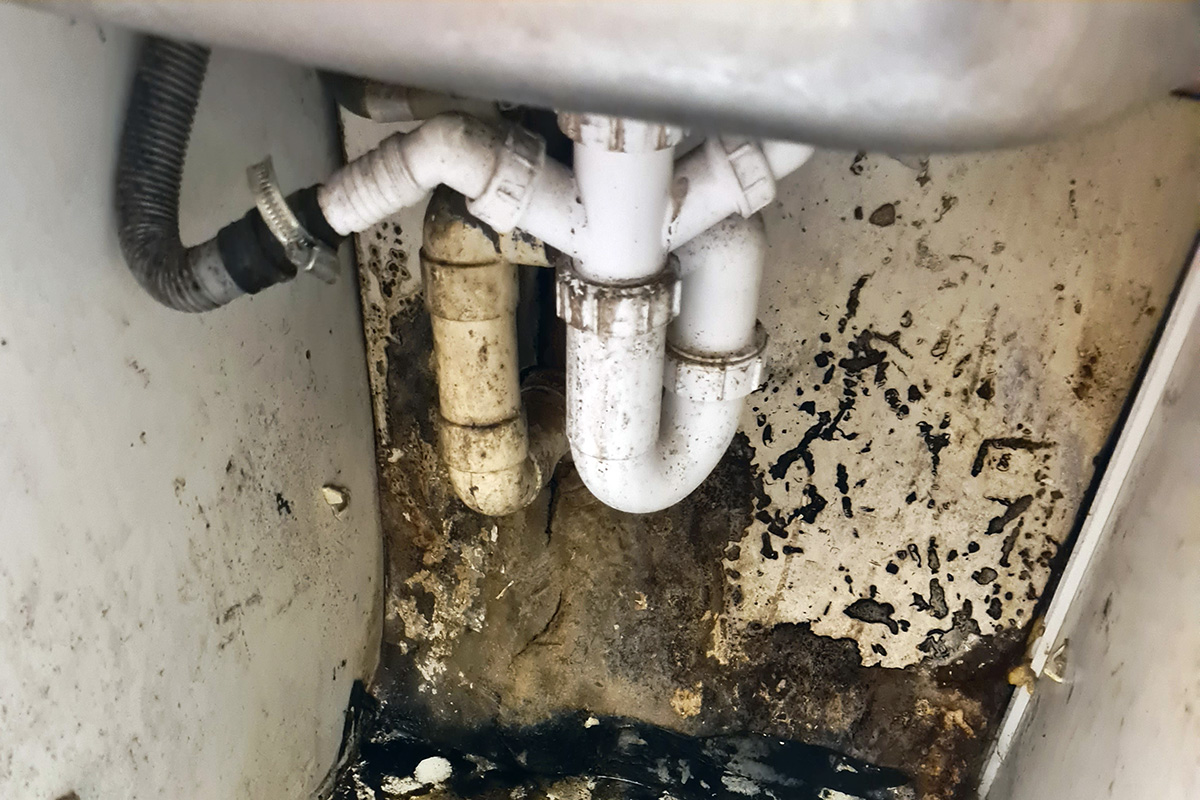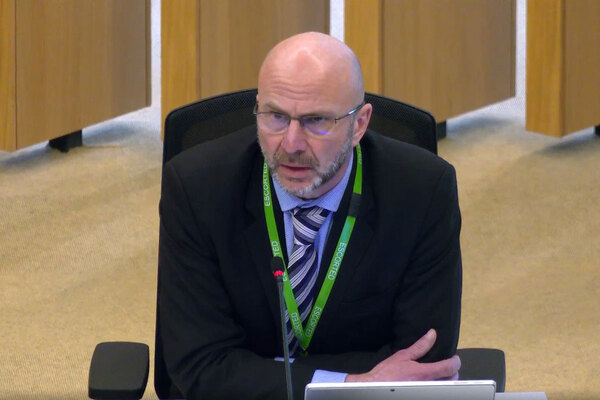You are viewing 1 of your 1 free articles
The estate where tenants are taking collective legal action on damp and mould
Tenants on one east London estate are teaming up to file a joint legal claim about the damp and mould in their homes. Katharine Swindells reports
“Put your hand up if you have problems with damp and mould in your home.”
Around 20 tenants raise their hands.
“Now put your hand up if you or anyone in your household has problems with breathing or coughing.”
The tenants stare around the circle of chairs at each other as almost every hand stays raised.
Many of the tenants look shocked, though the campaigners who helped organise the meeting don’t seem surprised.
It is February, and I am at a meeting of tenants and residents in the community centre on the Nags Head Estate, which was built in the 1930s in Tower Hamlets in east London. Co-ordinated with support from campaign groups Medact, Disability Rights UK and the London Renters Union, this is the third monthly meeting to discuss a group legal claim the tenants are filing against their landlord, Peabody, about the damp, mould and disrepair in their flats.
Damp and mould are one of the sector’s most-discussed topics, but while individual tenants have taken legal action, this collective legal action by residents of the same estate is still unusual. What leads tenants to take this kind of action, and are we likely to see more of it? And can it be a starting point for a more constructive landlord-tenant relationship? Inside Housing has come to find out more.
Everyone in the group has their own story to tell. We hear from Kevin Biderman and Helena Walsh, who co-founded the group after spending more than a decade trying to get the damp and mould in their flat addressed. They discovered thick black mould spreading across their teenage daughter’s bedroom more than five years ago; she now has respiratory issues and uses an inhaler.
Two tenants who did not want their names printed explained how the damp and mould in their flats have made their health significantly worse while they are recovering from cancer. Another shared that the mould has destroyed many treasured possessions, including irreplaceable photographs of his parents. Many, particularly those with children, are in flats that are extremely overcrowded.
Last October, the tenant group began to pursue a legal claim on a ‘no win, no fee’ basis with Anthony Gold, the law firm. They are now working to get as many tenants as possible signed up before mediation begins. Samantha Lewis, the Anthony Gold solicitor working on the case, says they are acting for clients in the group claim for matters of disrepair, nuisance, breach of the Homes (Fitness for Human Habitation) Act 2018 and breach of responsibilities in the Landlord and Tenant Act 1985.
Group claims, also known as ‘class action’ claims, like these are still uncommon, Ms Lewis explains, because they require a lot of organisation by the tenants, who all need to self-identify to the solicitors. They also need a law firm that has the capacity and willingness to take on so many claimants at once, something Anthony Gold specialises in. But Ms Lewis says she hopes to see more of these cases brought forward, as they allow for a whole-estate approach to disrepair, which allows the landlord to better understand the full scope of the problem, and ultimately benefits more households.
While the lawyers get to work, the Nags Head tenants have been working on getting publicity. One resident, Fatima, appeared on Channel 4 News in December. She shows me the damp carpets in her home and the breathing apparatus by her bed that she hides from her children. She still has not been decanted from this property.
Peabody provided a response statement to Inside Housing – which is printed in full at the end of this article – but did not comment on any specific tenants or cases mentioned.
When Fatima introduces herself at the meeting, the group claps and whoops for their local celebrity. “Since I was on TV, everyone wants to speak to me, everyone around the estate,” she says.
Most of the residents have lived here for more than 10 years, yet despite living alongside one another for all that time, they all thought they were alone. Now that they are united, there is a feeling of joy and energy in the room.
The tenants say it is about more than getting the mould fixed – it is about the way the landlord interacts with them.
Helena, Kevin and their daughter were decanted in March, the first of the few households who were moved. Since they have been in a different flat, they say their daughter’s breathing issues have vastly improved, but they are due to move back soon, and they fear that the repairs carried out will not have properly solved the problem.
It is a problem Kevin says their family have struggled with for the 15 years they have lived in their Nags Head flat, which is a market-rate tenancy intended for key workers. In the early years, the flat had a serious damp problem, and every repairs operative the landlord sent over would tell Kevin and Helena it was their fault. Finally, after years of these visits, it was discovered that the cause was a pipe that had been fitted incorrectly in the bathroom.
“It’s these outsourced companies who are just doing it as cheap as possible. There’s no connection between all the different moving parts, and they just fob you off,” Kevin says.
They had the same experience when they discovered black mould in their daughter’s bedroom. “We spent six months on the phone to them… Hours and hours of people not calling back, and people not doing stuff,” he says.
“It felt like it was my full-time job, just calling and calling,” Helena says.
Everyone Inside Housing spoke to had similar stories of ignored emails and hours spent on hold, to both Peabody and United Living, the company contracted to carry out responsive repairs for the estate.
“They constantly pass you on to other people, then to other companies. It’s exhausting,” says Jodie, another tenant. Many of the tenants in the meeting say they have resorted to doing repairs themselves, or they have stopped bothering to report minor issues at all.
A spokesperson from United Living says the contractor “is working closely with Peabody to resolve the problems that residents are experiencing”.
Kemi’s story
Kemi, a teaching assistant at a local special educational needs school, lives in a small, two bedroom flat on the Nags Head Estate with her four children aged between five and 15.
As we walk in, the flat is filled with the rich aroma of Nigerian beef stew cooking on the hob, but it doesn’t fully mask the smell of damp. By every window, thick patches of black mould spread up the walls and along the windowsills. Her children’s bedroom door is covered in it, the paintwork cracked and wood rotten. We pick our way through the flat as Kemi shows us the even-worse parts that aren’t so obvious to visitors: the ceiling above the shower, the cupboard under the sink.
Her 10-year-old daughter has been complaining of breathing problems for two years. When she went away recently on a school trip, the problem vanished. It came back within a few days of her returning to the flat.
When the mould first appeared a few years ago, Kemi tried to stay on top of it, but it kept coming back worse until it became unmanageable. Kemi has had such negative experiences reporting other repairs that she has never even told Peabody about the mould.
In the past, it has taken months of incessant calling to get something fixed. Her family had to wash using a bucket for six months while she hassled Peabody to fix the shower. Sometimes she would manage to schedule a repair, take the day off work to wait in, and the tradesperson would never show up.
“I think it was after the shower issue, that’s when I just kind of gave up on reporting,” she says. “I’m just tired and I’m really busy, so now I’ll only report big things.”
Kemi imagines spending her lunch break at work trying to report the mould, only to be made to feel like a bad mother for not cleaning enough, for drying her clothes inside, or for having too many children in the small space, and she just can’t bring herself to do it.
The damp and mould, and the stigma it brings, have had a huge impact on Kemi’s mental health. She starts crying multiple times during our interview. The feeling of shame about her home’s condition means she never has people round to visit, and doesn’t allow her children to have friends over.
“I feel bad, because I know the other mums are waiting for me to return the favour, but I just can’t.”
Because of these problems, she has slowly become very isolated. But the group of tenants on the estate offers a small glimmer of hope. At the meeting, she smiles as she gestures to her neighbour sitting next to her. “I think now I could maybe have Lorraine over to visit, and I know she wouldn’t judge me.”
Lorraine feels the same. “I didn’t realise how bad it was for my neighbours. It’s nice to know it’s not only me.”
Since they got lawyers involved, the tenants feel like they’re finally being taken seriously. “When the Peabody surveyor came over, he was in and out in 15 minutes,” one tenant with severe black mould in his flat says. “The independent surveyor from the [Anthony Gold] lawyers was there for two hours.”
The joint claim allows for evidence to be connected and cross-referenced. The solicitor’s survey says cases of penetrating damp, noise complaints and problems with mice are all attributable to structural issues with the walls and insulation.
The tenants hope this legal claim will force repairs and bring compensation, but they also want to see changes that go beyond the resolution of this case.
“What we want is a cutting-out of outsourced providers – getting rid of them to start with – and then insourcing properly,” Kevin says. “[We want] a good relationship between the departments we report to and the ones doing the work, where there’s enough people so that they can respond in a timely manner.”
Kevin adds: “As well as response repairs, there should be an investment team who are actually looking after their properties, so that in another 30 years they’re not having to battle the next lot of tenants in court, but that they’re actually doing these works, investing in their existing properties, and making them fit for human habitation.”
In a statement, Peabody told Inside Housing: “Due to their age and design, some of the homes are more prone to problems, so we’re reviewing how best to bring them up to standard. We’ve launched a programme of repairs to fix the immediate problems, while also looking at longer-term investment.”
The residents are determined to push for a shift in the relationship between them and their landlord.
“The relationship that we have with Peabody needs to radically change,” Kevin says. “What we need is an actual forum, where we can say to Peabody, ‘These are the needs of tenants, this is what you need to do’.
“I think housing associations have a real fear of losing control, or they just don’t trust tenants to be able to make these kinds of decisions. And actually, what we need them to understand is that Peabody isn’t them, Peabody is the tenants.”
Peabody’s response
In a statement to Inside Housing, a Peabody spokesperson said: “We’re very sorry for the time it’s taken to fix the issues in these homes and we’re looking into each individual claim.
“Due to their age and design, some of the homes are more prone to problems, so we’re reviewing how best to bring them up to standard. We’ve launched a programme of repairs to fix the immediate problems, while also looking at longer-term investment.
“We’ve appointed an independent surveyor to offer expert advice and assess the repairs needed so we can get them fixed as soon as possible.
“In the coming months, we’ll base a repairs team from United Living on the Nags Head estate to quickly resolve issues there and then. We’ve also appointed a specialist company to help make residents’ homes more efficient.
“It’s our priority to make sure all Peabody homes are safe and well maintained. Last year [financial year 2022-23] alone, we spent £356m on looking after residents’ homes and we plan to spend a further £2bn over the next few years.”
Recent longform articles by Katharine Swindells
Top 50 Biggest Builders 2024
Which are the 50 housing associations building the most homes? What tenures are they building? And, with warnings already sounded about starts by the G15, what is happening to the pipeline? Katharine Swindells reports
Ready to check out: the lengthy repairs forcing tenants to live in hotels
Inside Housing has found tenants waiting months in temporary accommodation for repairs on their homes to be completed – or even started. Katharine Swindells reports
The estate where tenants are taking collective legal action on damp and mould
Tenants on one east London estate are teaming up to file a joint legal claim about the damp and mould in their homes. Katharine Swindells reports
The case for flooring to be included when social homes are let
Wales has just passed regulations that new social lets must come with flooring included. But with hundreds of thousands of families across the UK still living in social homes without carpet and flooring, should English and Scottish social landlords follow suit? Katharine Swindells reports
Sign up for the IH long read bulletin
Already have an account? Click here to manage your newsletters












